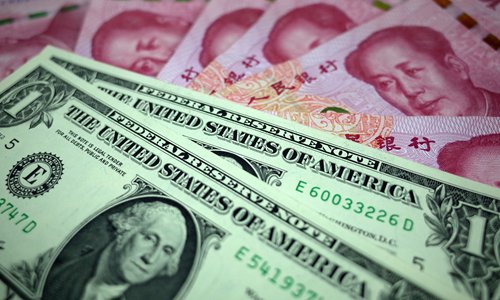
(Photo: IC)
The yuan's weakening past 7 against the US dollar and Washington's move to label China as a "currency manipulator" won't have any outsize negative impact on China although it will affect market sentiment, industry analysts said.
The yuan is set to return to stability over the longer term given China's economic and technological fundamentals and achievements in structural reform in recent years, they said.
The central parity rate of the yuan weakened 313 basis points to 6.9996 against the US dollar on Wednesday, closing lower for a fifth consecutive day.
In China's spot foreign exchange market, the yuan is allowed to rise or fall by 2 percent from the central parity rate each trading day.
As of press time, the onshore yuan was changing hands at 7.0431 per dollar, while the offshore yuan was at 7.0769 per dollar.
"In the medium and long term, the yuan does not meet the basic criteria for depreciation. The major factor for the exchange rate is economic development," said Yang Delong, chief economist at Shenzhen-based First Seafront Fund Management Co.
"In the next decade, China's economy will remain one of the most rapidly developing ones among major economies in the world, the growth speed of which far exceeds that of the US," Yang told the Global Times on Wednesday.
The benchmark Shanghai Composite Index closed 0.32 percent lower on Wednesday, while the Shenzhen index was down 0.50 percent.
The US Treasury moved to name China a "currency manipulator" on Monday (US time), a decision that was denounced by China's central bank and Chinese economists as groundless and self-destructive.
The designation followed both the onshore and offshore yuan breaching the 7 mark against the US dollar for the first time in more than a decade on Monday, days after US President Donald Trump threatened to impose more tariffs on imported Chinese goods.
Ding Shuang, head of greater China and North Asia economics research at Standard Chartered Bank, told the Global Times on Wednesday that the currency manipulator designation is unlikely to cause any real impact, given the limited space for the US to crack down on China upon its standards and the small chance that the US can gain IMF support.
The depreciation of the yuan is positive for China's exporters, but on the other hand, Chinese financial institutions and companies that issue US dollar-denominated bonds will face higher financing costs, Ding said.
"The yuan is unlikely to encounter large-scale or panic depreciation and China is keeping the door open for further trade negotiations," he noted, adding however, that China will no longer be responsible for the US' unilateral falling out.
Meanwhile, it is important for China to keep to its own pace in domestic reform and opening-up to attract more non-US economies, according to Ding.
If the China-US trade war further escalates, the possibility that China dumps some US Treasury securities cannot be ruled out, said Yang.


